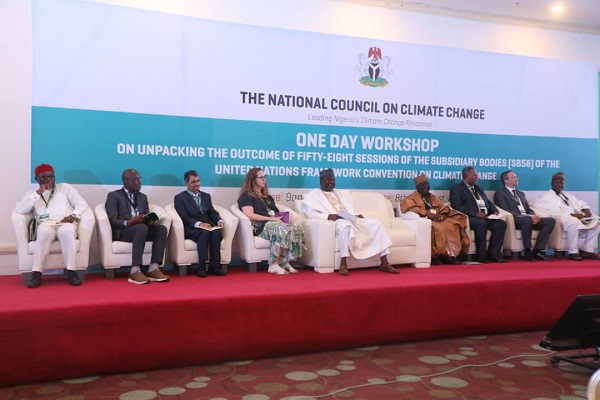
Vice President Kashim Shettima has highlighted Nigeria’s significant strides towards fulfilling its commitments under the Nationally Determined Contributions (NDCs) to address the challenges posed by climate change in the country.
He conveyed this information during a workshop themed “Unpacking the Outcomes of the 58th sessions of the subsidiary bodies of the United Nations Framework Convention on Climate Change.” The event, held in Abuja, was organised by the National Council on Climate Change (NCCC) with support from the United Nations Development Programme (UNDP), the German Agency for International Cooperation (GIZ), the Centre for Journalism Innovation and Development (CJID) and other stakeholders.
It’s important to recall that, in Nigeria’s first NDC, formulated in 2015, the country pledged a unilateral 20 per cent reduction in emissions compared to business-as-usual (BAU) levels and a conditional 45 per cent reduction commitment by 2030.
In 2021, Nigeria updated its NDC, maintaining the unconditional 20 per cent reduction target below business-as-usual emissions. Additionally, the country increased its conditional commitment target from 45 per cent to 47 per cent reduction below BAU emissions by 2030. Notably, Nigeria also committed to achieving Net Zero Carbon emissions by 2060.
Shettima elaborated on the actions Nigeria has taken to meet its NDC commitments. He highlighted Nigeria’s pioneering efforts in Africa to reduce short-lived climate pollutants (SLCPs), particularly methane, through the ongoing Nigeria Gas Commercialisation Programme. The country has also joined the global Net Zero Government Initiative.
“Our energy system decarbonisation plan emphasises the crucial role natural gas will play in our economy’s transition across sectors. Data and evidence indicate that Nigeria can continue using gas until 2040 without compromising the goals of the Paris Agreement.
“Meanwhile, we’re expeditiously advancing the development and deployment of renewables through initiatives like the $550 million Nigeria Electrification Project (NEP) supported by the World Bank. This project promotes the use of solar mini-grids and solar home systems nationwide. Moreover, the Nigeria Sovereign Investment Authority (NSIA)-managed project, jointly financed by Kano State and the Federal Government, has completed the largest 10MW solar plant in the country,” he articulated.
Shettima, represented by his deputy chief of staff, Sen. Ibrahim Hassan further highlighted interventions like the Energising Education Programme, implemented by the Rural Electrification Agency (REA), which is delivering clean energy to Federal universities and teaching hospitals across Nigeria.
He emphasised that the government also subsidises clean energy for rural women through the Rural Women Energy Security (RUWES) project and Rural Energy Access Project (REAP). In addition, schemes such as the Clean Energy Transportation Scheme (CETS) and the National Clean Cooking Scheme (NCCS) promote the use of CNG-powered buses and clean cooking practices.
“At the beginning of this administration, President Bola Ahmed Tinubu, GCFR, courageously ended petrol subsidies. Preliminary analysis by the National Council on Climate Change reveals a 30 per cent reduction in daily fuel consumption, approximately 20 million litres, equivalent to saving 42,800 tons of carbon dioxide (CO2e) emissions daily. Over a year, this translates to over 15 million tons of CO2e saved, representing a 40 per cent reduction in GHG emissions from the baseline projection for 2030. This puts Nigeria on track to achieve its NDC targets ahead of schedule,” he affirmed.
Earlier, the director-general of the NCCC, Dr. Salisu Dahiru emphasised the necessity for Nigeria to adequately prepare for COP28 and other essential meetings which would be held in Dubai, United Arab Emirates (UAE) later this year. The workshop analysed the outcomes of the UNFCCC SB58 meeting and aimed to outline Nigeria’s key priority areas for presentation at COP28. Dahiru underlined the critical significance of addressing climate change for Nigeria’s development and called for government support and guidance.


